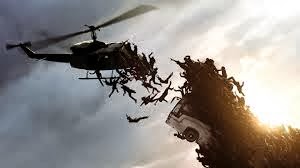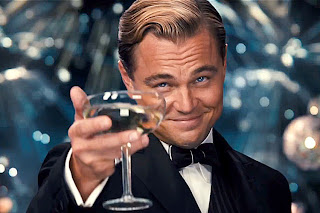In a recent post, I tried scratching the surface of a philosophical and psychological issue:
Are words the root of human suffering?
My initial conclusion was that they are not. After all, we have experiences and it is only after we are finished with these experiences that words even come into play. Anyone who has ever been "in the zone" knows about this phenomenon. Time, space, and certainly vocabulary all slow down while we have those experiences.
What those experiences are demands a level of description, and so words fill in the blanks.
But only after the experience is finished.
After. The root of anything cannot come after; therefore, words are not the culprit, merely the messenger. The conveyor.
I stand by this initial logic. (I think.) Instead of words, I am going to blame a scientific law for the suffering of humanity. Instead of words, I posit Inertia as the source of all bad things. After all, is it not one's ability to move forward (or sideways, or anywhere else) after destruction which dictates one's safety? It is much more about one
unsticking oneself from the bad place, following the law that an object at rest tends to stay at rest; therefore get a move on, buddy!
Let's face literary facts:
1. Hamlet dies because he couldn't walk and talk at the same time.
2. The Underground Man lives in a world of spite because he chooses to never leave.
3. Gatsby polishes this law up to a rare shine and tries passing it off as something else--call it love or fate or something equally gorgeous--but he doesn't transform it because Daisy chooses Tom.
4. The Bundrens technically are moving in Faulkner's
AILD, but they are more closely walking on a hamster wheel, displaying movement-as-stasis for they make no progress. Consider Anse's final proclamation: "Meet Mrs. Bundren."In a single line he resets the entire story back to its starting point, even further back, before Addie becomes sick.
5. Grendel feels slighted by the Danes and never moves on.
6. Holden feels terrible anguish over losing Allie and never moves on.
7. Mustapha Mond is charged with maintaining societal stability, and so he does not allow the world to move on.
8. Sydney Carton, anyone? It is a far, far better place indeed.
In his book
On Moral Fiction, John Gardner states "life is all conjunctions. One damn thing after another, cows
and wars
and chewing gum
and mountains; art--the best, most important art--is all subordination: guilt
because of sin
because of pain."
Life happens, and it moves on without fanfare.
Ands and
buts and
ors fill our days. Only upon reflection, that most human of all achievements, can we elevate any of these events to art, and only once elevated can any of these events stand in a subordinated state. Guilt, sin, pain, acc. to Gardner, come
after. They come with the art.
I would claim that even the words we attach to our events, the way we choose to describe them, are just another part of the
and-train of life. I woke up and I felt crummy and then I drank coffee and I felt epic and... It is only after I sit down and think backwards over my day that I get to inject further emotion, further joy or suffering into the day's events.
One final thing to consider: I recently read the
My Shot column in the September issue of
Golf Digest, this one by Grant Rogers, a golf pro at Bandon Dunes in Oregon. Rogers says:
Course marshals should try driving up on a slow group and telling them, "I've been following you, and I see that you're picking up the pace. Great job." I saw a marshal take this positive approach, and it really got people moving. It also made the marshal feel better about his job, which can be a tough one. Who likes to see a marshal coming up on their group?
If words are the root of human suffering, then they absolutely must also be the root of human glory. And if that's the case, then I don't mind being out-debated on this issue. Speak on, gentle reader.







